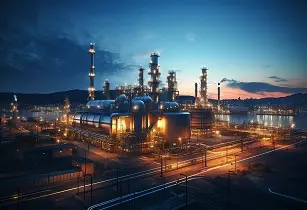On the occasion of the Eliminating Methane Emissions by 2030 roundtable partnered by the COP28 Presidency, TotalEnergies has announced the signing of three cooperation agreements with National Oil & Gas Companies (Petrobras in Brazil, SOCAR in Azerbaijan and Sonangol in Angola) to carry out methane detection and measurement campaigns using the AUSEA technology on oil and gas facilities in Brazil, Azerbaijan, and Angola
These agreements demonstrate the commitment of TotalEnergies and partnering National Oil & Gas companies to identify, quantify and reduce methane emissions and to encourage the entire oil and gas industry to aim for Zero Methane Emission by 2030.
Embarked on a drone, the AUSEA gas analyser, developed by TotalEnergies and its R&D partners, is currently one of the most accurate technologies in the world to detect and measure methane emissions.
Quick win against climate change
Methane emissions come from multiple sources: agricultural activities, fossil fuel production and use, decomposing waste, etc. For the oil & gas sector, slashing methane emissions from hydrocarbon production is a priority in its efforts to mitigate global warming.
After halving its methane emissions from its operated sites between 2010 and 2020, TotalEnergies set ambitious targets to step up its efforts and reduce methane emissions by a further 50% by 2025 – with the ambition to reach this target a year early, in 2024 - and by 80% in 2030, compared to 2020. In this respect, the Company has carried out last year a global campaign to measure methane emissions from its upstream operated activities using the AUSEA technology.
TotalEnergies is also committed to promoting the United Nations Oil and Gas Methane Partnership (OGMP 2.0) framework with other national and international oil companies. The Company has now held the OGMP Gold standard status for the three years in a row.
AUSEA
Since 2017, the Company has been working with R&D partners (CNRS and the University of Reims Champagne-Ardenne) to develop the pioneer AUSEA technology (Airborne Ultralight Spectrometer for Environmental Applications) to detect and quantify GHG emissions.
AUSEA consists of a miniature dual sensor capable of detecting methane and carbon dioxide emissions, while at the same time identifying their source. This ultralight drone-mounted technology ensures access to hard-to-reach emission points while delivering high-precision readings on all types of industrial facility, whether onshore or offshore. This technology marks a step change in methane emissions detection and measurement compared to traditional techniques such as infrared cameras, ground sensors and satellites.
Cooperation is key
TotalEnergies is now expanding its AUSEA initiative beyond its own operated assets. The three cooperation agreements aim to carry out AUSEA drone-based emissions measurement campaigns on facilities the Companies operate and demonstrate concrete actions taken to mobilise the oil & gas industry toward zero methane emissions.
"The COP28 Presidency counts on the mobilisation of all the major industrial sectors of the global economy to ensure the success of this conference. For the oil & gas industry, cutting methane emissions from operations is a priority as technologies are available. The first step is to measure emissions, asset by asset. By making our AUSEA technology available to our partners, TotalEnergies is taking a concrete step to encourage the whole industry, including National Companies, to aim for zero methane emissions," said Patrick Pouyanné, chairman and CEO of TotalEnergies.








